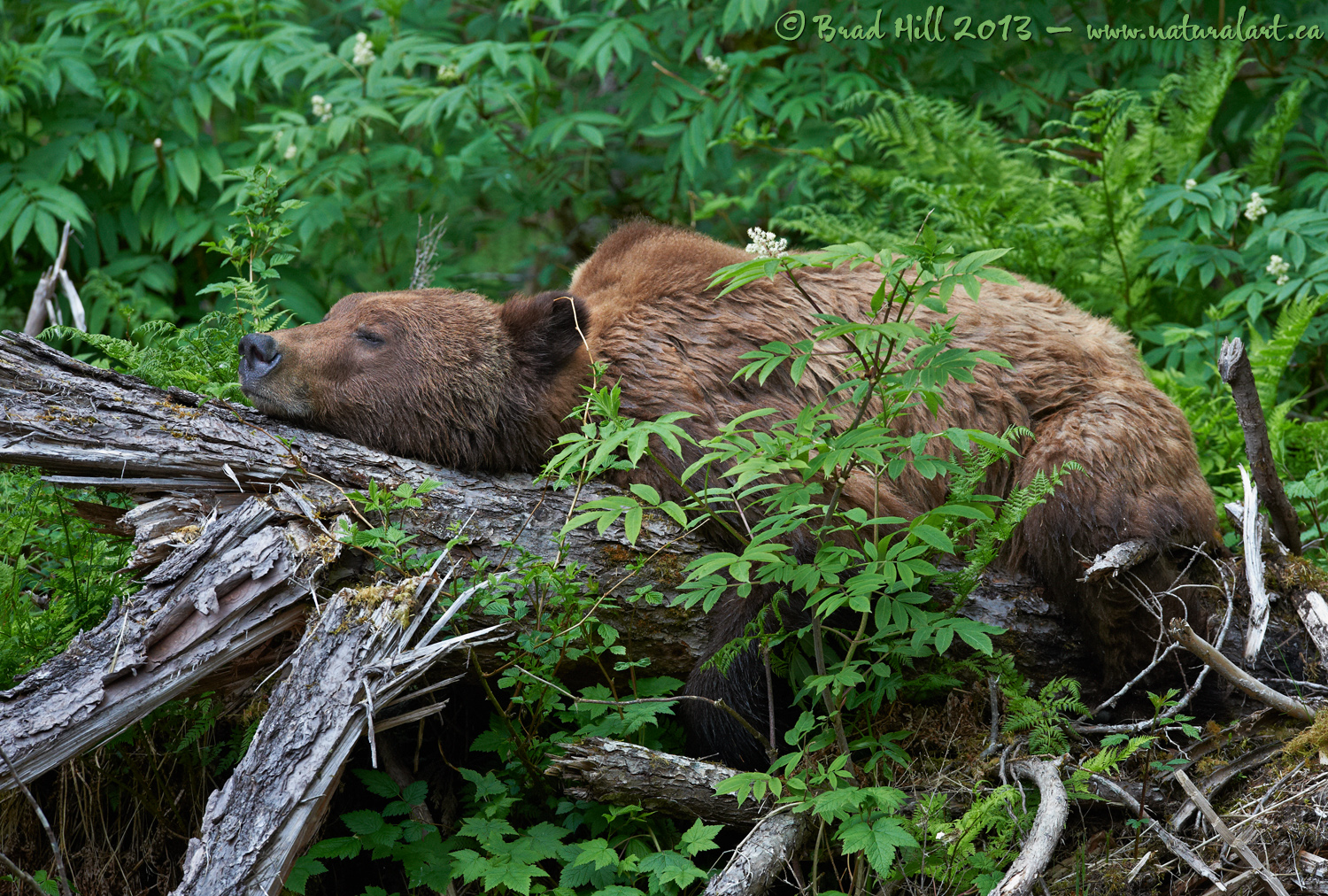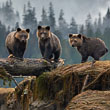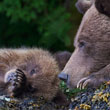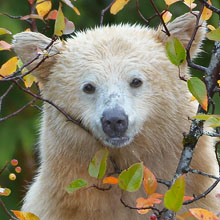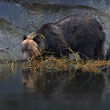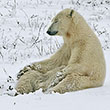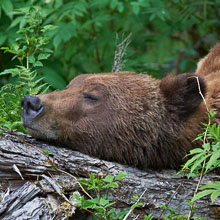Availability: Undetermined - Enquiries?
In the Field
Rest in Peace. Khutzeymateen Inlet, Great Bear Rainforest, BC, Canada. May 27, 2012.
Nope, not dead - just sleeping. But the title of this image nicely summarizes the philosophy that we approach bear photography with in the Khutzeymateen and in the Great Bear Rainforest in general. It's impossible to deny that wildlife photography can have a negative impact on the very subjects we revere, stalk and photograph. Any ethical wildlife photographer will do his or her utmost to minimize the negative impact on our subjects. And, of course, many wildlife photographers "do the right thing" and actively promote or initiate conservation causes.
The Khutzeymateen Grizzly Sanctuary is Canada's only grizzly sanctuary and is found in a very remote and inaccessible location. It is closed to the public and visited by under 200 humans per year. And, the two guides who are allowed to escort guests into the sanctuary treat the bears with the utmost of respect. On my annual photo tours into the Khutzeymateen I always work with one outfitter - Ocean Light II Adventures (you can check them out right here). One of the main reasons I chose to work with them is that we share the same philosophy about how the 60 or so bears that make the Khutzeymateen such an amazing place should be treated.
How do we judge when we've been successful in an encounter with a bear? Is it when we come back with great photos? Is it when we've witnessed a bear do something dramatic or something we've never seen before, like sparring with another bear? No. The best encounters are when we work with a bear for a while and it remains so calm and relaxed that it finally stops what it's doing, lies down, and goes to sleep right in front of us. And, as soon as the bear nods off we quietly withdraw, complete with the comforting knowledge that the bear trusted us fully and had a low-stress encounter.
Rest in peace buddy - and adios for now...
Here's a higher resolution (2400 pixel) version of the shot for those wanting to see more detail:
• Rest in Peace: Download 2400 pixel image (JPEG: 2.7 MB)
ADDITIONAL NOTES:
1. This image - in all resolutions - is protected by copyright. I'm fine with personal uses of them (including use as desktop backgrounds or screensavers on your own computer), but unauthorized commercial use of the image is prohibited by law. Thanks in advance for respecting my copyright!
2. This image was captured during one of my two spring "Grizzlies of the Khutzeymateen" photo tours in May/June of 2012. Each year I offer trips into two different parts of the Great Bear Rainforest as well as one to photograph aquatic mammals and oceanscapes near the northern tip of Vancouver Island. And, in selected years, I also offer photo tours to locations to capture other highly sought-after subjects, such as various boreal owl species and wildlife of Canada's Arctic. Details about these trips can be found on the Photo Tours page of this website.
3. Like all wildlife photographs on this website, this image was captured following the strict ethical guidelines described in The Wildlife FIRST! Principles of Photographer Conduct. I encourage all wildlife photographers to always put the welfare of their subjects above the value of their photographs.
Behind the Camera
Rest in Peace. Khutzeymateen Inlet, Great Bear Rainforest, BC, Canada. May 27, 2012.
Digital Capture; Compressed RAW (NEF) 14-bit format; ISO 2200
Nikon D4 paired with Nikkor 400mm f2.8 VRII lens. Hand held from floating Zodiac. VR on and in normal mode.
1/400s @ f6.3; -0.33 stop compensation from matrix-metered exposure setting.
At the Computer
Rest in Peace. Khutzeymateen Inlet, Great Bear Rainforest, BC, Canada. May 27, 2012.
RAW Conversion to 16-bit TIFF, including first-pass/capture sharpening using Capture One Pro Version 6. Three raw variants (processed from raw) differing by a total of 1.2 stops in exposure.
Further digital corrections on resulting 16-bit TIFF files using Adobe's Photoshop CS6 and Light Craft's Lightzone. Photoshop adjustments included compositing the raw conversion exposure variants, selective minor tweaks to exposure, selective colour saturation and desaturation, and selective sharpening for web output. Final tone tweaking performed using tonemapper/re-light tool in Lightzone.
Conservation
Rest in Peace. Khutzeymateen Inlet, Great Bear Rainforest, BC, Canada. May 27, 2012.
Ten percent of the revenue generated by this image will be donated to Raincoast*.
Species Status in Canada**: Special Concern (May 2002).
While Grizzly Bears (Ursus arctos) are not technically listed as "Endangered" in Canada, they have been extirpated from most of their historical range. Grizzly Bears are far more sensitive to intrusion/disturbance in their habitat than are Black Bears and are being increasingly forced into marginal habitat by human encroachment. The Great Bear Rainforest along the central and northern coast of British Columbia is one of the last strongholds of the Grizzly Bear in Canada, and even this population is coming under increasing pressure.
On December 18, 2017 the government of British Columbia banned grizzly hunting across the entire province. This major conservation victory came after decades of tireless work by many dedicated conservationists and ecologists and, most importantly, it reflects the opinion of the vast majority of British Columbians. And, it means that AT LEAST while the current government remains in power grizzlies are finally "safe" in British Columbia.
Now that we've at least temporarily won the battle to save grizzlies in BC, it's time to re-focus our efforts toward protecting ALL of BC's carnivores, including Gray Wolves, Black Bears, Cougars, Wolverines, and more! Simply put, there are no ecological, economic, or ethical arguments supporting the trophy hunting of carnivores.
In a great first step towards ending the hunting of carnivores throughout BC the Raincoast Conservation Foundation has developed a program designed to protect ALL carnivores within the Great Bear Rainforest. Details about this program can be found on this page on Raincoast's website. Check it out and, better yet, make a donation to help Raincoast purchase the remaining commercial hunting tenures in the Great Bear!
*The Raincoast Conservation Society (and Foundation) is an effective and efficient organization that has been fighting for protection of this unique habitat. If you are looking for a meaningful way to contribute to the conservation of this amazing ecosystem, Raincoast will provide maximal "bang" for your conservation dollars.
**as determined by COSEWIC: The Committee on the Status of Endangered Wildlife in Canada












